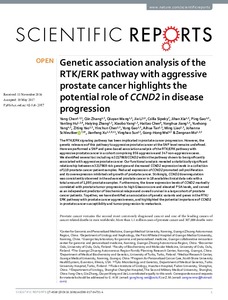Genetic association analysis of the RTK/ERK pathway with aggressive prostate cancer highlights the potential role of CCND2 in disease progression
Chen Y; Zhang Q; Wang QY; Li J; Sipeky C; Xia JH; Gao P; Hu YL; Zhang HY; Yang XB; Chen HT; Jiang YH; Yang YH; Yao ZT; Chen YC; Gao Y; Tan AH; Liao M; Schleutker J; Xu JF; Sun YH; Wei GH; Mo ZN; Mo ZN
Genetic association analysis of the RTK/ERK pathway with aggressive prostate cancer highlights the potential role of CCND2 in disease progression
Chen Y
Zhang Q
Wang QY
Li J
Sipeky C
Xia JH
Gao P
Hu YL
Zhang HY
Yang XB
Chen HT
Jiang YH
Yang YH
Yao ZT
Chen YC
Gao Y
Tan AH
Liao M
Schleutker J
Xu JF
Sun YH
Wei GH
Mo ZN
Mo ZN
NATURE PUBLISHING GROUP
Julkaisun pysyvä osoite on:
https://urn.fi/URN:NBN:fi-fe2021042717438
https://urn.fi/URN:NBN:fi-fe2021042717438
Tiivistelmä
The RTK/ERK signaling pathway has been implicated in prostate cancer progression. However, the genetic relevance of this pathway to aggressive prostate cancer at the SNP level remains undefined. Here we performed a SNP and gene-based association analysis of the RTK/ERK pathway with aggressive prostate cancer in a cohort comprising 956 aggressive and 347 non-aggressive cases. We identified several loci including rs3217869/CCND2 within the pathway shown to be significantly associated with aggressive prostate cancer. Our functional analysis revealed a statistically significant relationship between rs3217869 risk genotype and decreased CCND2 expression levels in a collection of 119 prostate cancer patient samples. Reduced expression of CCND2 promoted cell proliferation and its overexpression inhibited cell growth of prostate cancer. Strikingly, CCND2 downregulation was consistently observed in the advanced prostate cancer in 18 available clinical data sets with a total amount of 1,095 prostate samples. Furthermore, the lower expression levels of CCND2 markedly correlated with prostate tumor progression to high Gleason score and elevated PSA levels, and served as an independent predictor of biochemical relapse and overall survival in a large cohort of prostate cancer patients. Together, we have identified an association of genetic variants and genes in the RTK/ERK pathway with prostate cancer aggressiveness, and highlighted the potential importance of CCND2 in prostate cancer susceptibility and tumor progression to metastasis.
Kokoelmat
- Rinnakkaistallenteet [27094]
